 Why should women get short shrift? Women in Horror Month (February) is the shortest month of the year, even in a leap year! So, with that in mind, I’m doing my own extension of Women in Horror. I’ve featured 30 female poets, with Ann Scwader as guest today. There have been many award winners, nominees and extremely well published poets. I’ve had the chance to read more of their works and also read some new poets. Stay tuned; I’ll be featuring other writers from time to time, both male and female. I hope you’ve enjoyed these short interviews as well and continue to search out other works by the authors. The world is a vast and rich place, and the worlds shown by these poets expand those horizons.
Why should women get short shrift? Women in Horror Month (February) is the shortest month of the year, even in a leap year! So, with that in mind, I’m doing my own extension of Women in Horror. I’ve featured 30 female poets, with Ann Scwader as guest today. There have been many award winners, nominees and extremely well published poets. I’ve had the chance to read more of their works and also read some new poets. Stay tuned; I’ll be featuring other writers from time to time, both male and female. I hope you’ve enjoyed these short interviews as well and continue to search out other works by the authors. The world is a vast and rich place, and the worlds shown by these poets expand those horizons.
When did you discover poetry and who/what influenced you?
My first introduction to poetry was through the Good Doctor Seuss. I discovered early that rhyme and meter were absolutely magic. I read a lot of children’s poetry after that–think Beastly Boys & Ghastly Girls, not A.A. Milne! Later on, about high school age, I found Edna St. Vincent Millay and her remarkable sonnets. I know Millay’s not all that popular any more, but she taught me what a modern woman’s voice in sonnets could sound like.
Why do you write poetry?
Because I can’t help it? Mostly, because I pretty much always have written it, from grade school on. I love the sounds of words fitting themselves into patterns, and the way poetry will stick in the mind even when prose doesn’t–or at least, it doesn’t stick the same way. I’m also very interested in ancient history and archaeology, and poetry goes all the way back. It’s one of the earliest ways humans learned to carry stories around in their heads long-term, and share them with others for entertainment or information.
What do you think is the most difficult aspect in writing poetry?
I’m a formalist, so my major problem when starting a poem is to figure out what form will work best with the lines or phrases that have already popped into my head, or possibly with the story I want to tell. Once that’s been decided, things seem to move much more easily. I’ve never been prolific, and my speed seems to be getting even worse as the years go by. I tend to fiddle with individual words, trying to figure out which one sounds best with the rest of the line. I’m also overly conscious about repeating words too often in a poem, or making sure my line breaks don’t line up with my sentence breaks. There’s a lot of structural worrying. Poems very rarely just flow for me.
Time Ghosts
Our times call ghosts to us. Though Homer knew
the power of dark blood to loosen tongues
parched centuries past silence, we insist
on sensory amnesia when the same
shades permeate the wreck of Port-au-Prince
with Pompeii’s wailings. While the limbless wraiths
who stalk Rwanda mourn their martyring
in Cathar accents, or some murdered girl
misnames her honor killing as sati,
we disbelieve . . . as if coincidence
alone explained such wounds of history
reopening afresh to slake a thirst
familiar as the ghosts of our bad nights,
& like them wandering unsatisfied
between hells happening that no one meant.
## from Ideomancer #14.1, 2010
Do you explore particular themes? What are they and why?
Archaeology and astronomy / cosmology, though I frequently write about these subjects through a very dark filter. The bleaker side of SF also comes up a lot, and cosmic horror (Lovecraftian or otherwise) is my default when it comes to the really dark stuff. I’ve only had one completely themed collection. That was In the Yaddith Time (Mythos Books, 2007), my answer to Lovecraft’s Fungi From Yuggoth. It’s a very SF Lovecraftian sonnet sequenc –complete with laser carbines!–featuring a female POV and an apocalyptic ending. My other poetry collections have all been mixtures of dark SF and horror/dark fantasy.
What is it about dark (speculative) poetry that you think attracts people to read it?
It depends upon the type of dark poetry. Poetry has always been a part of traditional weird fiction magazines (like Weird Tales) and websites. Weird fiction readers are drawn to formal dark verse very easily, though they may not appreciate free verse in quite the same way. I’m not sure what other horror readers are looking for when they turn to poetry, though poetry has always, always been a big part of horror. Thank you, E.A. Poe.
What projects (publications) are you working on or have coming up?
I’ve just turned in a new collection of dark poetry to Weird House Press. The title is Unquiet Stars. I’m very excited to be working with Joe Morey & F.J. Bergmann on this one! As usual–at least, for my last few collections–this one has a new sonnet sequence: “Faces From the House of Pain.”
Void Music
Space is not silent, save for mundane ears
Attuned to flesh alone. The aether swells
With arias & whispers while we tell
Our tales of plasma waves, reshaping fear
As placid science. Island-dwellers cast
Adrift by proxy on a vast black sea
Should trust a little less in certainties
So fragile: did we voyage here unasked
Expecting welcome? Blind inside this drape
Of instruments, our curiosity
Expands as hubris, exponentially,
Athirst for evidence of our escape.
Meanwhile in undimensioned night beyond
Our sphere of ignorance, strange shadows drift
& sing the death of starlight. One by one,
Their threnodies thread ripples through this pond
Reality . . . until some chorus shifts
To sound the flickering of our brief sun.
## from Spectral Realms #2, 2015
Is there anything else about writing, horror or poetry you would like to say?
I’d just like to put in a good word for rhyme, meter, and form in general when it comes to horror poetry. Well-crafted lines of formal verse have a way of haunting the mind, sometimes long after the poem itself has been put aside. Stark, startling imagery is fine–but I think there’s room in our field for spectral music as well.
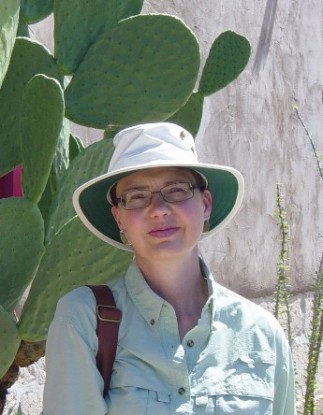 Ann K. Schwader is a poet, short fiction writer, and occasional reviewer of SF and dark works. She lives, writes, and volunteers at her local branch library in suburban Colorado. Her eighth speculative poetry collection, Unquiet Stars, is forthcoming from Weird House Press in late 2020.
Ann K. Schwader is a poet, short fiction writer, and occasional reviewer of SF and dark works. She lives, writes, and volunteers at her local branch library in suburban Colorado. Her eighth speculative poetry collection, Unquiet Stars, is forthcoming from Weird House Press in late 2020.
Other poetry collections, readily available and otherwise, include: Dark Energies (P’rea Press 2015), Twisted in Dream (Hippocampus Press, 2011), Wild Hunt of the Stars (Sam’s Dot, 2010), In the Yaddith Time (Mythos Books, 2007), Architectures of Night (Dark Regions Press, 2003), The Worms Remember (Hive Press, 2001), and Werewoman ( Nocturnal Publications, 1990). Ann also has two collections of weird/Lovecraftian short fiction: Dark Equinox & Other Tales of Lovecraftian Horror (Hippocampus Press, 2015) and Strange Stars & Alien Shadows (Lindisfarne Press, 2003).
She is a two-time Bram Stoker Award Finalist (for Dark Energies and Wild Hunt of the Stars) and a two-time winner of the Science Fiction & Fantasy Poetry Association’s Rhysling Award (once each for short and long-form poetry). SFPA named her a Grand Master in 2019.
Website: http://www.schwader.net/home
Dreamwidth blog, Yaddith Times
Goodreads Author profile



 longing for the world. The most difficult aspect of writing poetry, then, isn’t finding the shape or the words or the idea, it’s the ability to let the world go long enough to invoke the energy that is the poem, to bring it into being. The ordinary world in which we all live is filled with obligations and tasks, responsibilities to be checked off and managed. We flit from one thing to the next, barely being in the world despite the time we spend. Poetry demands a deeper engagement, a vulnerability that comes from setting down those other duties and reins. I think the most difficult aspect of writing poetry is the point in the process when we must let go of our grasp on the ordinary world, trust our tether to allow us a space to create and a path to return. Composing poetry is a bit like falling into a trance; it isn’t something you can do while driving to the post office, but something you have to lean into. It needs deep time, and finding that time can be a challenge in our modern, busy lives!
longing for the world. The most difficult aspect of writing poetry, then, isn’t finding the shape or the words or the idea, it’s the ability to let the world go long enough to invoke the energy that is the poem, to bring it into being. The ordinary world in which we all live is filled with obligations and tasks, responsibilities to be checked off and managed. We flit from one thing to the next, barely being in the world despite the time we spend. Poetry demands a deeper engagement, a vulnerability that comes from setting down those other duties and reins. I think the most difficult aspect of writing poetry is the point in the process when we must let go of our grasp on the ordinary world, trust our tether to allow us a space to create and a path to return. Composing poetry is a bit like falling into a trance; it isn’t something you can do while driving to the post office, but something you have to lean into. It needs deep time, and finding that time can be a challenge in our modern, busy lives!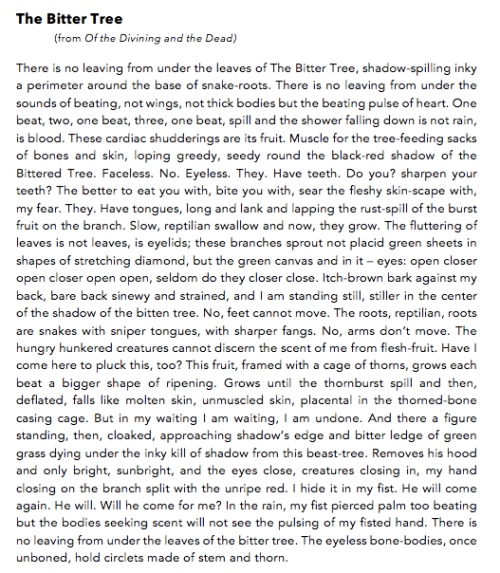

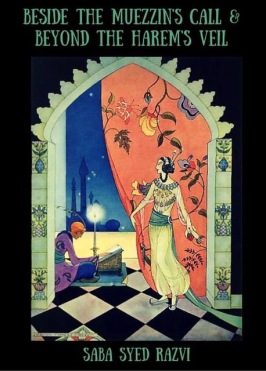 About my poetry: I like to test the limits of language, its textures and materiality, its logic and its magic. My poems are often fashioned into invented or embellished forms, sometimes inherited from gestures of divination or worship, from storytelling and from science. I tend to prefer things that are complicated, that slip between our expectations, and I write poems in such a manner that exaggerates such a sensibility in my form and my cadence. I’m not interested in making the familiar new, but in making the weird even weirder. My formal innovation and defiance of strictly traditional forms is a kind of linguistic play and ritual, all at once. As such, I tend to be drawn to and to explore literary works that blur the lines in all ways. A rebel on the page, if not in life! My academic research tends to explore more social and communal aspects of literature, technology, science, and the speculative. I’m drawn to the ways in which our literature reaches back into our human heritage, and what it projects forward with its words and with its technologies. After all, our language is all haunted and its words are the machines through which we experience those echoes of memory and the valence of the expression. I’m interested in work that blurs the lines and the distinctions, that deliberately transgresses the structures of literary art and human experience. It is my hope that my own work can inspire the same kind of interest in others as I feel for the things I write about and the things study.
About my poetry: I like to test the limits of language, its textures and materiality, its logic and its magic. My poems are often fashioned into invented or embellished forms, sometimes inherited from gestures of divination or worship, from storytelling and from science. I tend to prefer things that are complicated, that slip between our expectations, and I write poems in such a manner that exaggerates such a sensibility in my form and my cadence. I’m not interested in making the familiar new, but in making the weird even weirder. My formal innovation and defiance of strictly traditional forms is a kind of linguistic play and ritual, all at once. As such, I tend to be drawn to and to explore literary works that blur the lines in all ways. A rebel on the page, if not in life! My academic research tends to explore more social and communal aspects of literature, technology, science, and the speculative. I’m drawn to the ways in which our literature reaches back into our human heritage, and what it projects forward with its words and with its technologies. After all, our language is all haunted and its words are the machines through which we experience those echoes of memory and the valence of the expression. I’m interested in work that blurs the lines and the distinctions, that deliberately transgresses the structures of literary art and human experience. It is my hope that my own work can inspire the same kind of interest in others as I feel for the things I write about and the things study. Crocodile Gardens (Agape Editions) and the collection heliophobia (Finishing Line Press), which appeared on the Preliminary Ballot for the Bram Stoker Award ® for Superior Achievement in Poetry, as well as the chapbooks Limerence & Lux (Chax Press), Of the Divining and the Dead (Finishing Line Press), and Beside the Muezzin’s Call & Beyond the Harem’s Veil (Finishing Line Press). She is currently an Assistant Professor of English and Creative Writing at the University of Houston in Victoria, TX, where in addition to working on scholarly research on interfaces between contemporary poetry and science and on gender & sexuality in speculative and horror literature and pop-culture, she is writing new poems and fiction.
Crocodile Gardens (Agape Editions) and the collection heliophobia (Finishing Line Press), which appeared on the Preliminary Ballot for the Bram Stoker Award ® for Superior Achievement in Poetry, as well as the chapbooks Limerence & Lux (Chax Press), Of the Divining and the Dead (Finishing Line Press), and Beside the Muezzin’s Call & Beyond the Harem’s Veil (Finishing Line Press). She is currently an Assistant Professor of English and Creative Writing at the University of Houston in Victoria, TX, where in addition to working on scholarly research on interfaces between contemporary poetry and science and on gender & sexuality in speculative and horror literature and pop-culture, she is writing new poems and fiction. Deeply hidden along the mysterious coast of Canada, there is another Woman in Horror. Today’s guest is Marcie Lynn Tentchoff.
Deeply hidden along the mysterious coast of Canada, there is another Woman in Horror. Today’s guest is Marcie Lynn Tentchoff. I love to write about bitterness, about making difficult and possibly the wrong choices. I also love writing about how things can be different when seen from differing viewpoints, and how the tales behind known characters and character types are often darker and more complex.
I love to write about bitterness, about making difficult and possibly the wrong choices. I also love writing about how things can be different when seen from differing viewpoints, and how the tales behind known characters and character types are often darker and more complex.
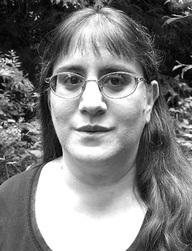 Marcie Lynn Tentchoff is a poet/writer/editor/acting teacher who lives on the west coast of Canada with her various family members, both humanoid and rather obviously not. Her work has appeared in such publications as Strange Horizons, Polu Texni, Star*Line, Polar Borealis, and Dreams & Nightmares. There have been two collections of her poetry, Sometimes While Dreaming, and Through the Window: A Journey to the Borderlands of Faerie, as well as On the Brink of Never, a collection of poems by her writing group.
Marcie Lynn Tentchoff is a poet/writer/editor/acting teacher who lives on the west coast of Canada with her various family members, both humanoid and rather obviously not. Her work has appeared in such publications as Strange Horizons, Polu Texni, Star*Line, Polar Borealis, and Dreams & Nightmares. There have been two collections of her poetry, Sometimes While Dreaming, and Through the Window: A Journey to the Borderlands of Faerie, as well as On the Brink of Never, a collection of poems by her writing group. Carina Bissett graces the virtual pages for Women in Horror Month. The month is nearly at an end but the poetry continues strong.
Carina Bissett graces the virtual pages for Women in Horror Month. The month is nearly at an end but the poetry continues strong. Why do you write poetry?
Why do you write poetry? fairy tale. I also have a Snow White retelling coming out in Arterial Bloom, which was edited by Mercedes Murdock Yardley and is scheduled for release by Crystal Lake Publishing in April 2020. It features some wickedly gorgeous work, and I’m ecstatic that my story is included in this anthology.
fairy tale. I also have a Snow White retelling coming out in Arterial Bloom, which was edited by Mercedes Murdock Yardley and is scheduled for release by Crystal Lake Publishing in April 2020. It features some wickedly gorgeous work, and I’m ecstatic that my story is included in this anthology. Carina Bissett is a writer, poet, and educator working primarily in the fields of dark fiction and interstitial art. Her short fiction and poetry have been published in multiple journals and anthologies including Arterial Bloom, Gorgon: Stories of Emergence, Hath No Fury, Mythic Delirium, NonBinary Review, and the HWA Poetry Showcase Vol. V and VI. She teaches online workshops at The Storied Imaginarium, and she is a graduate of the Creative Writing MFA program at Stonecoast. Her work has been nominated for several awards including the Pushcart Prize and the Sundress Publications Best of the Net. Links to her work can be found at
Carina Bissett is a writer, poet, and educator working primarily in the fields of dark fiction and interstitial art. Her short fiction and poetry have been published in multiple journals and anthologies including Arterial Bloom, Gorgon: Stories of Emergence, Hath No Fury, Mythic Delirium, NonBinary Review, and the HWA Poetry Showcase Vol. V and VI. She teaches online workshops at The Storied Imaginarium, and she is a graduate of the Creative Writing MFA program at Stonecoast. Her work has been nominated for several awards including the Pushcart Prize and the Sundress Publications Best of the Net. Links to her work can be found at  Today’s guest is LindaAnn LoSchiavo, who hails from New York, where she writes poetry and does dramatic presentations as well.
Today’s guest is LindaAnn LoSchiavo, who hails from New York, where she writes poetry and does dramatic presentations as well. Excitement, Red Wolf Editions, 2018, Concupiscent Consumption, Red Ferret Press, 2020, and
Excitement, Red Wolf Editions, 2018, Concupiscent Consumption, Red Ferret Press, 2020, and  When did you discover poetry and who influenced you?
When did you discover poetry and who influenced you?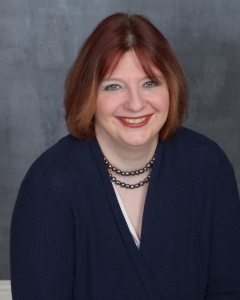 husband and son. Her poetry has received Rhysling, Dwarf Star, and Pushcart nominations and has been published at over fifty venues; her short fiction has appeared in Galaxy’s Edge, Compelling Science Fiction, and Pseudopod. For more about her work, please see
husband and son. Her poetry has received Rhysling, Dwarf Star, and Pushcart nominations and has been published at over fifty venues; her short fiction has appeared in Galaxy’s Edge, Compelling Science Fiction, and Pseudopod. For more about her work, please see  Why do you write poetry?
Why do you write poetry?
 What projects (publications) are you working on or have coming up?
What projects (publications) are you working on or have coming up? metaphysical nonfiction. She is the author’s liaison for the academic journal Coreopsis: Journal of Myth and Theatre, and writes a quarterly column for Star*Line. She also helms Rev. Dee’s Apothecary: a New Orleans-Style Botanica, available online at
metaphysical nonfiction. She is the author’s liaison for the academic journal Coreopsis: Journal of Myth and Theatre, and writes a quarterly column for Star*Line. She also helms Rev. Dee’s Apothecary: a New Orleans-Style Botanica, available online at 
 A Summoning of Demons
A Summoning of Demons
 ## published in Call of the God: An Anthology Exploring the Divine Masculine Within Modern Paganism, 2015
## published in Call of the God: An Anthology Exploring the Divine Masculine Within Modern Paganism, 2015 Michelle Jeffrey is a poet, artist, dreamer and cat whisperer who likes to weave mythology, music and poetry into the rhythm of rituals and ceremonies. She is a regular contributor of poetry and articles to pagan magazines in Australia. Her poetry has also appeared in the Spectral Realms: A Weird Poetry Journal and Call of the God: An Anthology Exploring the Divine Masculine Within Modern Paganism. Michelle resides in Sydney, Australia with her husband and two cats.
Michelle Jeffrey is a poet, artist, dreamer and cat whisperer who likes to weave mythology, music and poetry into the rhythm of rituals and ceremonies. She is a regular contributor of poetry and articles to pagan magazines in Australia. Her poetry has also appeared in the Spectral Realms: A Weird Poetry Journal and Call of the God: An Anthology Exploring the Divine Masculine Within Modern Paganism. Michelle resides in Sydney, Australia with her husband and two cats.
 When did you discover poetry and who/what influenced you?
When did you discover poetry and who/what influenced you? She is a Rhysling-nominated speculative poet, horror writer and librarian. Her poetry has been published in Strange Horizons, Liminality, Pedestal Magazine and Eye to the Telescope. Her stories have appeared in the New England Horror Writers anthologies, Wicked Haunted and Wicked Weird, The Muse & The Flame and Toasted Cake podcast. Her debut fiction collection, Dark Blood Comes from the Feet, is out in May from Trepidatio Publishing. Emma lives with her husband, Steve, and three exceptional animals: Odin, Mothra and M. Bison (also known as Grim). She is a member of the New England Horror Writers, the Science Fiction & Fantasy Poetry Association, the Angela Carter Society and the Tuesday Mayhem Society. Her website is
She is a Rhysling-nominated speculative poet, horror writer and librarian. Her poetry has been published in Strange Horizons, Liminality, Pedestal Magazine and Eye to the Telescope. Her stories have appeared in the New England Horror Writers anthologies, Wicked Haunted and Wicked Weird, The Muse & The Flame and Toasted Cake podcast. Her debut fiction collection, Dark Blood Comes from the Feet, is out in May from Trepidatio Publishing. Emma lives with her husband, Steve, and three exceptional animals: Odin, Mothra and M. Bison (also known as Grim). She is a member of the New England Horror Writers, the Science Fiction & Fantasy Poetry Association, the Angela Carter Society and the Tuesday Mayhem Society. Her website is  I am also releasing two related book series. My Poetic Reflections collections and columns encompass a wide variety of poems. In my Darkverse series I am literally putting together the “dark verse” and have released a volume titled Darkverse: The Shadow Hours. It’s available in E-book and illustrated print editions. I plan to launch a series for my humorous verse as well.
I am also releasing two related book series. My Poetic Reflections collections and columns encompass a wide variety of poems. In my Darkverse series I am literally putting together the “dark verse” and have released a volume titled Darkverse: The Shadow Hours. It’s available in E-book and illustrated print editions. I plan to launch a series for my humorous verse as well.